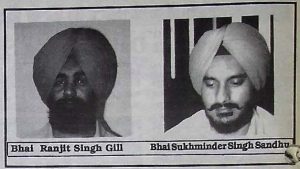
Sukhminder Singh Sandhu, a/k/a “Sukhi,” and Ranjit Singh Gill, a/k/a “Kukki,”
Discussion
- Absence of Bilateral Treaty ‘The United States and India have never executed a bilateral treaty providing forex tradition. Rather, extradition is accomplished pursuant to the terms of a 1931 treaty between the United States and Great Britain that included a provision allowing Britain to extend the treaty coverage to its colonies, which at that time included India, Australia, and Canada among others. See Extradition Treaty with Great Britain, Dec. 22,1931, 47 Stat.2122. Although the United States has entered into bilateral extradition treaties with other former British colonies, it did not do so with India after that nation achieved independence in 1947.
The respondents argue that the doctrine of non-inquiry is grounded on the premise that no case by case examination of the judicial processes or human rights Conditions in the requesting country is warranted where they have already been implicitly accepted by the executive and judicial branches through the treaty making process. But where, as here, there is no treaty, this premise is removed, and the respondents contend that the rule of non-inquiry need not be adhered to.
This argument might have some force in circumstances where the requesting country has recently undergone a cataclysmic change in government. For example, the justification for non-inquiry with respect to a democratic treaty partner may dissolve if that country’s government is over thrown by a despot, even if the treaty has not yet been abrogated. But that is not the case here. For almost50 years the United States has chosen to treat the government of India as successor to the British colonial government for extradition purposes. This acquiescence demonstrates a general acceptance of procedures and conditions in India sufficient to support continuing application of the non-inquiry doctrine.
- Proof of Human Rights Violations
The proffered evidence of human rights violations presents a far more compelling argument for relaxation of the rule of non-inquiry. Unlike any other reported case this one contains proof of both systematic government sanctioned human rights abuses in the requesting country and governmental misconduct directed specifically at the respondents and others charged with the same offenses.
- Systematic Abuses the respondents have proffered stark evidence that the government of India has acquiesced in the torture and extrajudicial execution of members of the Sikh minority who advocate an independent state in Punjab. This evidence includes comprehensive reports from respected human rights organizations including Human Rights Watch and Amnesty International, as well as country reports submitted to Congress by the United States Department of State. (Respondents’ Supplemental Appendix, Doc. AAA, BBB, CCC, DDD, EEE, FFF, MMM, NNN, OOO, QQQ, TIT, UUU, XXX, YYY). While some of these reports date back several years, others are quite current. This evidence is supplemented by affidavits de tailing specific instances of ille gal detention of Sikhs by the Indian authorities, fabrication of false charges against them, torture and execution during staged “encounters” with the police. (Aff. A, B, G, I, J, K, O, U, X, AA, DD). This proof of government sanctioned human rights abuses in the requesting country distinguishes this case from Sindona y. Grant, 619 F. 2d 167 (2d Cir. 1980). In Sindona, the respondent proffered evidence that ex tradition to Italy “would subject him to risk of murder or injury at the hands of political enemies.” The court further rejected the argument that Gallina required the reexamination of the principle of exclusive executive discretion. Id, at 17475. However, nothing in Sindona suggested that the government of Italy itself tolerated the abuse of any class of extradites. Any threat to Mr. Sindona, then, originated from sources outside the government, so that honoring: the Italian government’s request for extradition would not place the imprimatur of the United States courts on policy of human rights abuse. By contrast returning Sikh suspects to India in the face of the proffered evidence of systematic abuse by that government would entangle the United States in the offensive policies.
Article extracted from this publication >> September 4, 1996